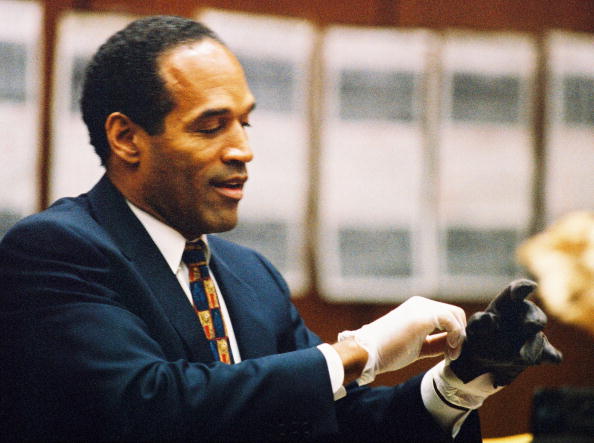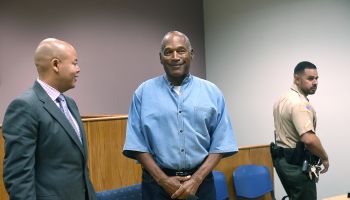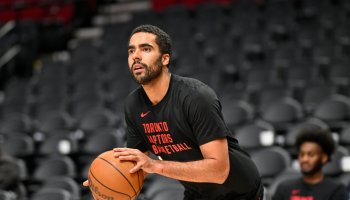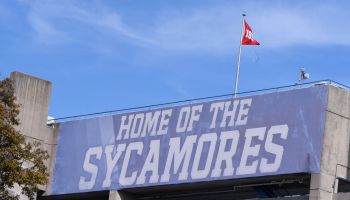LONDON — Four days of rioting last August have cast a shadow over the neighborhoods where the world’s top athletes will compete next summer at the 2012 London Games. Some Olympic events will occur just a few miles away from areas hit by Britain’s worst riots in a generation.
Both London and the Olympics were irrevocably altered.
And so were the lives of those who live here. Sam Kato, 12, practices with the Newham All Star Sports Academy, an oasis in east London from the crime, gangs and drugs that helped fuel last summer’s riots. The program helps keep kids out of trouble and teaches them the value of teamwork.
“It’s like a family to me,” the 6-foot-1 Kato said as the gym reverberated with basketballs rhythmically hitting the wooden floor. “If there were more programs like this, I doubt there would be riots.”
Newham hosts the Olympic Park, center of the 2012 games.
Complex security plans for the Olympics have been altered after the riots, which shocked Britain and damaged London’s image abroad. Those plans were also updated after student demonstrations in London that included a spontaneous attack on Prince Charles and wife Camilla and the “Occupy London” encampment near the city’s financial district.
The riots exposed the limits of what police could handle in terms of dramatic and unforeseen events. After a weak initial response, thousands of police officers were brought in to help swamp London’s streets in a show of force, discouraging further trouble.
The Olympics will already keep 12,000 officers occupied on the busiest days, so any riot repeat will push resources further still.
“(Planners) are learning the lessons from the riots,” said Margaret Gilmore, an expert at the Royal United Services Institute, a respected think tank. “Some demonstrations and protests are almost inevitable and they are likely to take a tougher line and use more officers in dealing with riots.”
Fears over street unrest come alongside the biggest Olympic worry: terrorism. Security has been an intricate part of the games since a terror attack at the 1972 Olympics in Munich killed 11 Israeli athletes and coaches. London has not been immune from terror attacks — four suicide bombers targeted the city’s transit network in 2005, killing 52 commuters.
But the advent of riots was a late addition to the planning mix, which has been under way for years. Even now plans are still being refined.
“What you have to remember is that in the last Olympics people were worried about al-Qaida threats,” said Ellis Cashmore, a professor of culture, media and sport at Staffordshire University. “What the riots have done is alert people to the fact that London may not be such a safe city after all.”
Tough economic times in Britain mean underlying tensions aren’t getting better any time soon. Unemployment this year passed the 1 million mark for young people for the first time since the mid-1980s.
Austerity measures meant to put the country back in the black have cut support for many programs geared at helping young people, and Britain’s youth unemployment rate has risen to about 20 percent. Youth workers say the desperation and hopelessness felt by many British teens and young adults is likely to be even worse next summer than this year.
Olympic officials have declared themselves unconcerned about any legacy from the riots. Denis Oswald, head of the International Olympic Committee’s coordination commission for London, told reporters recently that he was in London during the unrest and believed the situation was “quite quickly under control.”
Oswald looked at the bright side, noting that many people showed up for impromptu work crews to help hard-hit merchants clean up after the looting.
“I don’t think this has put any negative image on London or on the games,” he said.
The riots were triggered by the fatal police shooting of 29-year-old Mark Duggan in the working-class London district of Tottenham. Duggan’s death, under disputed circumstances, touched off anger, quickly followed by thrown bricks, burning cars and looting. An interim report on the unrest concluded this week that the slow police response to the looting led people to believe they wouldn’t get caught.
Between 13,000 and 15,000 people took part in the riots and the report said more than three-quarters were 24 or younger.
But there were 460 notable exceptions — the members of Newham basketball club. Director Natasha Hart and her coaches quickly organized a training camp to give them somewhere to go for several days.
“No one was involved,” she said. “I don’t think that’s a coincidence.”
Newham is one of the poorest areas in Britain, with 25 percent of its households below the poverty line. A primary stopping point for new immigrants, dozens of languages are spoken in its schools. Many immigrants are also transient, fraying any sense of community cohesion.
Kids here worry about gangs, for gang territory is strictly defined. A block or two in any direction can become a no-go zone.
But on the basketball court, everyone is welcome.
Hart, a Russian emigre, is the daughter of an Olympic basketball player and a professional boxer who simply wanted to share her love of basketball with her two sons. The single mother started by organizing pick up games and practices at a local park.
Seven years later, she listens to the hooting and hollering in the sparkling gym at Rokeby school and shakes her head. There are little kids running around, big little kids like Kato refining their moves, teenage girls who dream of playing at American powerhouses like the University of Tennessee, and young men without jobs who just want to play.
The abbreviation of the club’s name — NASSA — evokes the U.S. space program and its reach for the heavens, something the kids joke about.
“These children, they want to belong to something,” Hart said. “I think we deserve it. Don’t you?”
RELATED:
















